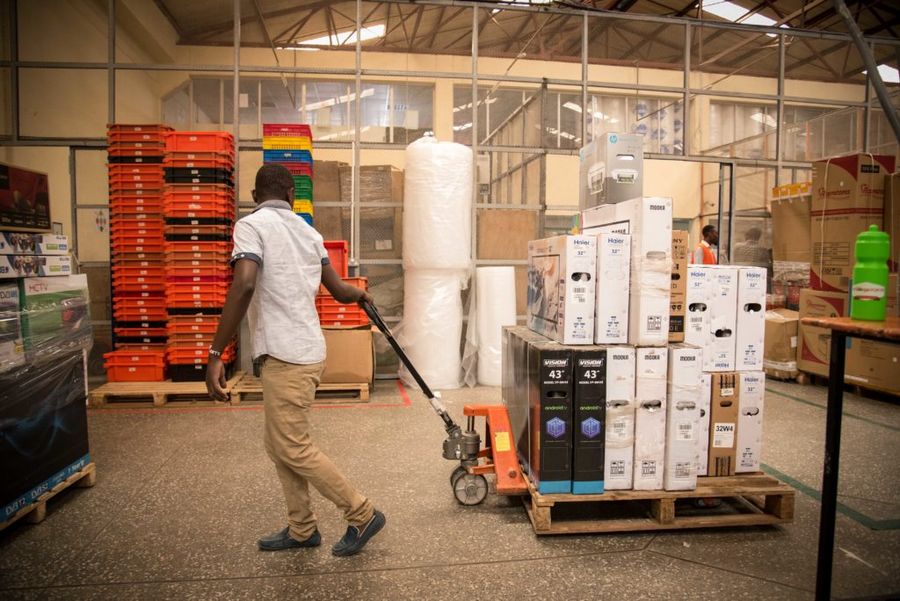Jumia, which has been described as Africa's Alibaba, is currently seeking closer cooperation with China in order to boost its sales.
By Olatunji Saliu
LAGOS, Nov. 1 (Xinhua) -- The next minute after Halidu Ismail Obaje, a dispatch rider of Jumia, Africa's largest e-commerce firm, called a customer to deliver his order, he set out for the journey in the Ikeja neighborhood of Lagos, Nigeria's commercial hub.
The journey lasted about half an hour, as Obaje snaked between trapped vehicles amid the traffic snarl that characterizes frenetic Lagos.
"This is Obaje calling again from Jumia. I am here with your package," he told the customer, who emerged minutes later from an office building in the Adeniyi Jones axis of Ikeja, via telephone.
It was a Friday. Fridays are usually busy days for Obaje and others who defy traffic in Lagos to finish their daily deliveries. It was also a rainy day, with heavier traffic.
"I still have many deliveries to make. They're up to 28 more deliveries that I must make today. And, this task, I must complete within the next three hours," he told Xinhua as he zoomed off on his delivery bike.
Every day, Obaje delivers up to 50 or more parcels to customers in this city. He is a member of a community of over 700 dispatch riders who go about with the business of delivering packages in retail quantities to customers across this west African country, using motorcycles, tricycles, or vans.
Although less than 1 percent of the retail business in Africa is happening online, Jumia, headquartered in Lagos, lays claim to building digital Africa, connecting Africans with each other, as well as bringing consumer goods and services to all.
On the African continent, Jumia has apparently carved a niche for itself, building a household name in e-commerce and logistics service delivery.
Nigeria, Africa's most populous country, with about 200 million people, remains Jumia's biggest market accounting for some 25 percent of its entire transactions.

The photo shows the staff of Jumia is sorting products in the warehouse center. (Provided to Xinhua by Jumia)
IDEA MEETS OPPORTUNITY
One of the key challenges facing the e-commerce sector in Africa is the lack of adequate infrastructure to ensure that products ordered online reach consumers in a timely and cost-effective manner.
Jumia, founded in 2012, started as a collective effort of its founding team who tried to create something new and positive, with the aim of building an ecosystem around e-commerce.
"We were seeing e-commerce becoming so big everywhere," Sacha Poignonnec, a co-founder of Jumia, told Xinhua while referring to the thoughts that pre-formed the coming of the firm between 2008 and 2009.
"So we started with the idea to bring e-commerce to Africa. What we had on our minds were the usual questions: If you are thinking of commerce, you need products, sellers, consumers, logistics and you need payment."
"The biggest was to say, look, let's try and learn; and let's turn the challenges into opportunities," Poignonnec said.
The bold step of setting up Jumia by its founders has, apparently, paid off. Predating the African Continental Free Trade Area (AfCTFA) agreement which entered its operational phase in July, Jumia has ensured that its e-commerce platform is a typical example of breaking trade barriers within Africa.
So far, the firm has been able to penetrate 14 countries in Africa and covered about 700 million people.

The photo shows Jumia's dispatch rider is delivering food to customers who order online. (Provided to Xinhua by Jumia)
HOW JUMIA OPERATES
Nowadays, it is not uncommon to see Nigerians, mostly the youths, browsing around the Jumia app or website in search of what to buy, either through their telephones and tablets or computers.
The firm's operation has expanded over the years as the figure of consumers continues to rise, with Jumia creating not just a link, but also a value for the consumers and sellers.
Originally, it was all about putting a few products online, mobile phones, fashion, and other basic assortments with a technology that tracks the items ordered by consumers.
When an item is ordered, either locally or globally, the sellers will see it and send it to a collection center or to some of the firm's partners who help with shipment by air to Nigeria, according to Tolu George-Yanwah, head of Jumia's logistics service department.
"We have various partners that we work with in terms of customs clearance. We follow the rules, otherwise, they would not be cleared. Our logistics platform is a collection of every possible logistics service that can ever happen in Nigeria," George-Yanwah said.
In Nigeria alone, Jumia has over 100 pickup stations and hubs, where vendors across the country converge. These hubs serve as collection centers for the dispatch riders like Obaje, who makes more income as they deliver more items to consumers.
The firm boasts of three warehouses in Nigeria. It has a specialized one in Lagos and two multi-source warehouses in the capital, Abuja, and the oil hub, Port Harcourt.
From these locations, items ordered from local or global sources are sorted out and sent to the customers.
Since last year, she said Jumia had handled over 14 million packages across Africa. And Nigeria alone makes up 40 percent of that volume.
Likewise, more than 80,000 sellers have transacted on the Jumia platform so far.

The photo shows some consumers select products with the App of Jumia online shopping. (Provided to Xinhua by Jumia)
INSPIRATION FROM CHINA
E-commerce is becoming big in many countries in recent years. Alibaba in China is one example.
According to the co-founder of Jumia, Poignonnec, the ecosystem, from its philosophy to its practical approach to attract and maintain consumers, is very close to that of Alibaba, one of China's largest e-commerce platforms and one of the world's forerunners in that sector.
Alibaba started as a small operation by developing solutions that meet consumers' needs.
Drawing inspiration from Alibaba's sales promotion on such days as "Double-11," in which they enjoy rocketing transaction values, Jumia said it launched the Black Friday for that same purpose.
Held annually between the second Friday of November and the last, Black Friday has been the biggest shopping event for Jumia, with amazing discounts on hundreds of products.
"For that, Alibaba is a good inspiration, as well as some of the others, because they have a lot of experience," Poignonnec said, noting African consumers love the discount sales event.
"For us, Black Friday is a very interesting event because a lot of sellers, brands and consumers trade and do some shopping at this time. I think it is part of a platform to create excitement. "
Jumia, which has been described as Africa's Alibaba, is currently seeking closer cooperation with China in order to boost its sales.
"I admire Alibaba because it is such an amazing company that has so much success. We look up to all the big corporate successes and Alibaba is one of them. They are so successful in China and even outside of China. We look up to their success," he said further.
As part of its moves to expand its frontiers, the company sent its representatives to participate in the Sixth World Internet Conference that took place from October 20 to 22 in Wuzhen, Zhejiang Province, to explore more partnerships with the Chinese firms.

Guests attend a sub-forum of the sixth World Internet Conference at Wuzhen, east China's Zhejiang Province, Oct. 21, 2019. (Xinhua/Huang Zongzhi)
It was the first time for Jumia to participate in the conference. The company said ahead of the conference in Wuzhen that it prioritized the conference because of its deep admiration of the Chinese Internet ecosystem.
The company hoped to develop critical business partnerships with global leaders in the e-commerce space including those from China while, also, learning from China's well-advanced e-commerce industry.
Poignonnec said he believes that e-commerce will soon become the next big thing in Africa, although it is quite difficult to develop because of the lack of adequate infrastructure, landscape, and other factors.
That is why it is necessary to study the development model of China's e-commerce firms and learn some valuable lessons, he said.
Three years ago, Jumia opened an office in the Chinese city of Shenzhen with two personnel and that office has since grown to 50 staff members who perform many functions, including sourcing for vendors to supply their digital marketplace. It already has about 1,000 Chinese sellers on its platform.
"When we talk to our Chinese partners they know about the business model and that triggers very good discussions. I am very much looking forward to my visit to China and I hope to strike some more good partnerships," Poignonnec said, confirming there are a lot of inbound requests from Chinese partners.
"We are very interested to create an African market in China. There is now a bigger African community in China," said he.■



